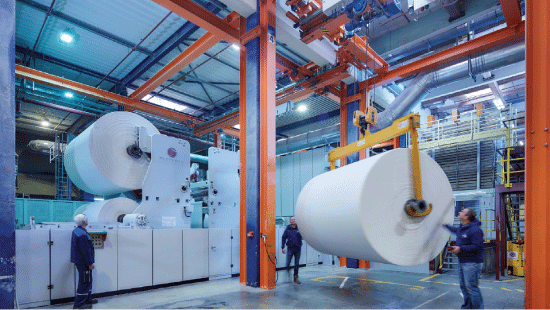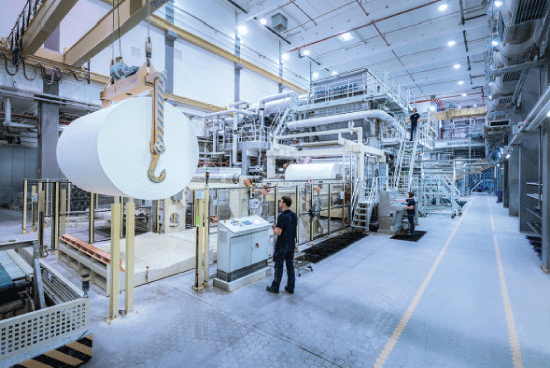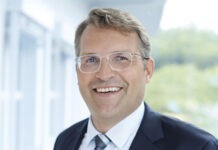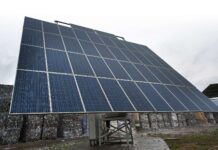A key ‘produce where you sell’ policy is just one of the strategies behind the consumer sector’s second largest private label manufacturer. TWM talked to Hendrik Otto, chief operating officer, WEPA Group. By Helen Morris, Senior Editor.
TWM/1: What presence does the WEPA Group have in Germany?
“In Germany, the WEPA Group has five locations: two in North Rhine-Westphalia and one each in Rhineland-Palatinate, Saxony and Saxony-Anhalt. We operate a total of ten paper machines here with a production capacity of around 400,000 tonnes. We produce toilet paper and kitchen towels in four mills, one of which also produces towel paper and industrial rolls.
“The plant in Saxony is our competence centre for folded products such as handkerchiefs and cosmetic tissues. We are constantly investing in the expansion and modernisation of all our sites. For example, in 2015 we commissioned a new, energy-efficient paper machine with an annual capacity of 30,000 metric tonnes at our Marsberg-Giershagen mill. This site is today the largest production site in the WEPA Group with around 500 employees.
“In the consumer segment, we are the second largest private label manufacturer in Germany and supply our products to all relevant retail chains. In the AfH market, we supply both private labels and WEPA branded products, e.g. Satino, to wholesalers and specialist retailers.”

TWM/2: Are you looking to grow in the German tissue market, if so, how and when?
“The German market is highly concentrated. 80% of the turnover in the consumer business is generated by the five largest retailers, all of which are supplied by WEPA with private labels. Our growth is therefore generated by the usual annual growth rates, which in Germany are around 1-2%. However, we also take advantage of opportunities to acquire further quantities when opportunities present themselves and at adequate margins.
“The situation in AfH, on the other hand, is somewhat different: Here there is still potential due to the broader customer base. Market growth in this area is also higher. “For certain product groups, such as handkerchiefs and
cosmetic tissues, we have set up competence centres from which we supply other European countries.
“Also, we are able to supply neighbouring countries from all our locations in Germany and can participate in market growth there.”
TWM/3: Are you seeing overcapacity in the German tissue market? How are you dealing with this?
“There is no overcapacity in Germany, and production and sales are essentially in balance. However, deliveries from neighbouring countries lead to an oversupply, which in turn keeps prices under pressure. We generate added value for our customers with a lean cost structure, marketable qualities an additional services in the service area.”
TWM/4: Do you export, and if so, what percentage?
“The WEPA Group has a well-established network of production sites in Europe. If it is appropriate for logistical or production reasons, products are also sold across borders, but this is not our goal. “Produce where you sell” is particularly important for WEPA in terms of sustainability.
“We are convinced that production close to the sales markets makes it possible to run plants leaner and to optimise transport costs, especially for our high-volume goods. This makes sense from both an economic and an ecological point of view.”
TWM/5: What percentage of private label products make up the German tissue market?
“Retailers are increasingly using their private labels as “their brand” and WEPA is supporting them with quality, concepts and service. Decades ago, we specialised in private labels and have longstanding partnerships with our customers.”
TWM/6: Are environmentally-friendly products popular here, is it a key sector for you?
“WEPA is regarded as a recycling specialist among the European tissue paper manufacturers. This is an essential component of our overall sustainable orientation and a determining element of our raw material strategy, because the use of waste paper protects our forests and consumes less energy and water. The fresh fibres used by WEPA come from sustainable sources and a certified timber industry.
“For some years now, we have also been present on the market with a hybrid product that is gaining increasing market share, especially in the German consumer market. For consumers, it is first and foremost the quality in terms of softness and safety that must be right. To meet these requirements, however, it is not only the choice of raw materials that is decisive. Our Hybrid Fair Fibre concept is the intelligent combination of recycled fibres and cellulose that meet consumer demands in terms of
ecology and comfort. Recent studies confirm that more than 80% of respondents like the Hybrid Fair Fibre product just as much as a pulp product in a direct comparison, whereby a Hybrid Fair Fibre product with a proportion of 30% recycled fibres has a 20% improved environmental footprint.”
TWM/7: Is growth in the German tissue market flat?
“In the consumer segment, the sales market in Germany is relatively stable, with overall growth rates of around 1%. However, individual products in various categories are showing higher growth, e.g. handkerchiefs in boxes. This is based on changes in consumer behaviour. The AfH sector, on the other hand, is growing somewhat faster. This is certainly also due to the fact that people are more mobile today and hygiene requirements are also rising on the move.”
TWM/8: How is the current economy impacting the German tissue market? What opportunities does this present for you?
“In Germany, the quality of tissue paper is strongly linked to the number of layers, i.e. the more layers the higher the quality of the product. When the economy is weaker and incomes fall, products with fewer layers are more likely to be purchased and vice versa. Overall, however, the quantity of hygienic papers sold is not particularly dependent on economic development.”
TWM/9: What are the main challenges for you in the next few years?
“There are certainly some challenges that we will face. First of all, there are the commodity markets. The availability of raw materials – pulp as well as recovered paper – will continue to have a considerable influence on raw material prices.
“For pulp, there is also the development of the $/EUR exchange rate, which is taken into account here in Europe. This makes it all the more important for us to gain experience with alternative raw materials or optimised fibre use in order to at least partially offset these risks.
“Unstable governments and different legislations in Europe also influence the economic success of companies. Furthermore, the challenges in the field of ecological sustainability will not result in low additional costs. First and foremost, energy supply and the corresponding price development should be mentioned. In the long term, we cannot yet predict in detail how the phaseout of nuclear and coal energy will affect Germany.
“And last but not least, there is an upcoming lack of qualified and trained personnel in Germany, especially in the logistics sector. Delivery bottlenecks can already occur today because there are no longer enough drivers for the available freight space.
“Despite all the demands and changes, however, we believe to be well positioned to meet these challenges.”
TWM/10: And the main opportunities?
“Hygiene papers are daily necessities that hardly anyone in Germany and Europe wants to do without. Sales are stable, growth rates result from increasing hygiene requirements and new fields of application. The paper industry is also a sustainable industry that works with renewable raw materials and the efficient use of resources. The WEPA Group is a family owned company in this sector and particularly well positioned in the areas of raw material, energy and water consumption with a broad range of measures to increase efficiency. We produce sustainable bulk goods and attach great importance to training and further education, occupational safety and quality and environmental management. Together with our customers in the consumer and AfH sectors, we want to develop even more sustainable products and feel very well equipped for this with our value- and return-oriented corporate culture. We accept the challenges of the market and want to successfully shape our future as an agile and sustainable family-owned company.”


































